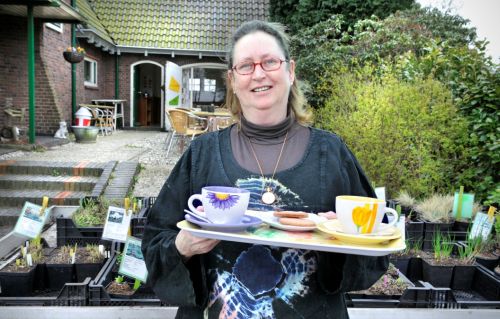Non-farmers often have extra income in countryside

Alongside their regular job, regular citizens living in the countryside are remarkably likely to have an additional income stream. This could be in the form of the sale of fruit, a dog-grooming salon in the garage, a small campsite or a little antique shop. The space available there lends itself perfectly to this, and it is also a good way of maintaining one’s social life. As this is clearly cottage industry without much in the way of growth ambition, municipalities do not need to lay down any regulations to keep such activities in check. This is the conclusion of a field study by social geographer Marianna Markantoni, who will be awarded a PhD by the University of Groningen on 3 May 2012.
It is a familiar scene for anyone driving through rural villages: signs saying ‘Potatoes for sale’, ‘hairdressers’ in lettering on a barn and signs for bed & breakfasts and small campsites. The people behind these signs tend not to be farmers but are instead regular citizens. It is a group that has been completely overlooked by policymakers, Markantoni discovered. ‘Strangely enough, no one has studied this type of additional income generation in the countryside, whereas there has been research galore into farmers’ extra income streams. You cannot trace these extra income streams that easily at the Chamber of Commerce, for example, because by no means everything is registered there and what is registered is often not an additional income stream. We therefore got 45 students to cycle through all the streets of 36 municipalities and investigate each sign that indicated such a mini-business.’
Lifestyle
These surveys showed that no fewer than 506 non-farmers had such an additional income stream, that is to say, a small business at home upon which they do not depend for their income. The greater part has an annual turnover of less than € 15,000 per year. It is more a question of lifestyle than necessity. Markantoni says, ‘It does of course have to generate something but above all it should be fun. Central government therefore does not need to worry that businesses will arise from this that will spoil the countryside. On the contrary: these kinds of activities greatly contribute to the quality of life there. It would be a shame to put a stop to that with extra regulations.’ The study showed that 72% of the owners had no desire whatsoever to expand their business.
Social ties
The contribution to the economy by all these small businesses might well be small but they do forge stronger social ties in the villages and, furthermore, they attract tourists and other clients from the urban centres to the countryside. It is precisely the proximity of towns that makes these kinds of activities possible. The enterprising countryside-dwellers often only realize that they can make a few bob with a little gallery or an artisan carpentry business once they are already living there. It contributes to their quality of life, Markantoni says. And it also shows that the countryside can actually be a suitable environment in which to set up a small business.
Part of a larger study
Markantoni’s study is just one small part of the bigger picture that her supervisor Prof. Dirk Strijker is trying to gain of the countryside. ‘As a professor of rural development my particular focus is the role of non-farmers in the countryside, for example, their participation in the community or the need for a fibre-optic network. Much is known about farmers but a lot less about ‘normal’ citizens. It is not research that should steer rural policy; it is academic interest. It is a way of understanding more about the countryside.’
Curriculum vitae
Marianna Markantoni (Athens, 1980) was awarded Master’s degrees in Agricultural Engineering by the University of Athens and Rural Sociology by Wageningen University. She conducted her PhD research at the Faculty of Spatial Sciences of the University of Groningen. She now works at the Rural Society Research Group of the Scottish Agricultural College in Edinburgh, UK. The title of her thesis is: ‘Side activities by non-farmers, In search for personal and rural development’. Her supervisor is Prof. Dirk Strijker.
Note for the press
Contact: Marianna Markantoni, tel. 00-44-7932085101 or marianna.markantoni sac.ac.uk
Prof. Dirk Strijker, tel. 050-363 3726, e-mail: d.strijker rug.nl
| Last modified: | 27 August 2021 09.32 a.m. |
More news
-
24 March 2025
UG 28th in World's Most International Universities 2025 rankings
The University of Groningen has been ranked 28th in the World's Most International Universities 2025 by Times Higher Education. With this, the UG leaves behind institutions such as MIT and Harvard. The 28th place marks an increase of five places: in...
-
11 March 2025
East Groningen: universal basic services must be up to standard
Sjierdan Koster makes the case for long-term thinking and for bringing Groningen’s universal basic services up to standard.
-
05 March 2025
Women in Science
The UG celebrates International Women’s Day with a special photo series: Women in Science.
